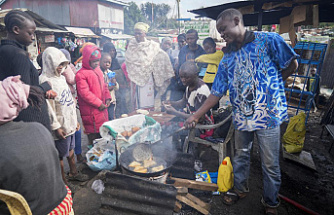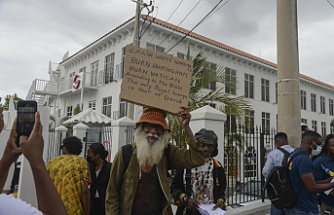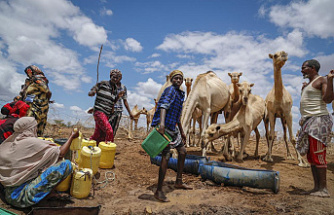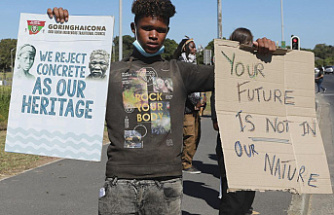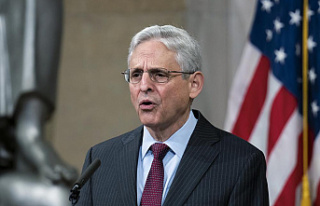Their mission to reduce vaccine disparities is reflected in the energy they bring to the brightly lit labs. Moderna's COVID-19 shot is being replicated by the scientists, who are effectively attempting to end an industry that favors rich countries over poor.
They are doing this with an unusual backing from World Health Organization. This organization is co-coordinating a South African vaccine research, production and training hub, as well as a supply chain for crucial raw materials. This is a last-resort effort for people who are unable to afford vaccines. The intellectual property implications of this project are still unclear.
Emile Hendricks (22 years old) is a biotechnologist at Afrigen Biologics and Vaccines. The company is trying to replicate the Moderna shot. "We cannot rely on these superpowers to save us."
Experts believe that reverse engineering, which is the process of creating vaccines using fragments of publicly available information, is one of the few remaining methods to correct the power imbalances caused by the pandemic. According to an analysis done by the People's Vaccine Alliance, only 0.7% of vaccines have been sent to low-income countries. Nearly half have gone on to rich countries.
The WHO is leading the effort to produce a vaccine. This is despite the fact that it relies on the goodwill of rich countries and the pharmaceutical industry.
COVAX, a U.N.-backed initiative to level out vaccine distribution worldwide, has not helped alleviate severe shortages in developing countries. The amount of vaccines being donated is only a fraction of the total needed to close the gap. Despite the pressure from drug companies to share, which includes Moderna demands by Biden, this has not led anywhere.
WHO has not participated in the creation of a new vaccine for global use. This was despite the objections from the original developers. Moderna, German partner BioNTech and Pfizer used the Cape Town hub to increase access to the new messenger RNA technology in their vaccines.
Martin Friede, WHO vaccine research coordinator, is helping to direct the hub.
Former head of the U.S. Centers for Disease Control and Prevention has described the world's current situation as being "held hostage" by Moderna and Pfizer whose vaccines are the most effective against COVID-19. The new mRNA process, which uses the genetic code of the spike protein from the coronavirus, is believed to stimulate a stronger immune response than traditional vaccines.
The Biden administration argued that Moderna's vaccine research was largely funded by American taxpayers. It has demanded that the company increase production to supply developing countries. Depending on how many vaccines are available, the global shortage for 2022 will be between 500 million and 4 trillion doses.
David Kessler, head of Operation Warp Speed (a U.S. program to accelerate COVID-19 vaccination development), stated that "the United States government played a very significant role in Moderna becoming the company it is."
Kessler wouldn't say how far the administration would press the company. He said, "They know what we expect to happen."
Moderna has promised to build a vaccine plant in Africa in the near future. Some poor countries have given up on the promise of Moderna to build a vaccine factory in Africa, despite appealing to drugmakers for their raw materials and technological knowhow.
Petro Terblanche, Afrigen's Managing Director, stated that the Cape Town company aims to have a Moderna vaccine available for testing on people within one year. It will then be scaled up for commercial production shortly thereafter.
"Big Pharma is a strong competitor to us. Terblanche stated that they don't want us to succeed. "They are already saying that we don’t have the ability to do this. They will be shown."
Terblanche stated that if the South African team succeeds in creating a vaccine version of Moderna, the information will be made public for others to use. This sharing is closer than the approach U.S. President Joe Biden advocated in spring, and which the pharmaceutical industry strongly opposes.
Intellectual property can become a problem when commercial production takes place. Moderna said that it will not sue a company for violating its vaccine rights. However, it has not offered to assist companies who have signed up to produce its mRNA shots.
Noubar Afeyan, Chairman of Moderna, stated that Moderna believes it is better to grow production than to share technology. Moderna plans to deliver billions more doses next year.
Afeyan stated that the best way to produce high-quality vaccines in a timely manner is to do so within six to nine months.
Zoltan Kis is an expert on messenger RNA vaccines at the University of Sheffield in Britain. He said that it was possible to reproduce Moderna's vaccine, but it would be much easier if the company had its expertise. Kis estimates that the process requires only a dozen steps. However, there are some tricky steps, like sealing fragile messenger RNA in liquid nanoparticles.
He said, "It's almost like a complicated cooking recipe." "Having the recipe would make it very easy, and it would also be helpful if someone could demonstrate how to do it."
Moderna, a U.N.-backed public healthcare organization, still hopes to convince Moderna that it is not the right approach when it comes to providing vaccines to poorer countries. The Medicines Patent Pool was established in 2010 and initially focused on convincing pharmaceutical firms to share patents for AIDS drugs.
Charles Gore, Executive Director of South Africa's vaccine hub, stated that it is not about outsiders supporting Africa. "Africa needs to be empowered and that's why this project is important."
Gore will eventually resolve the intellectual property issue. He said that the work to reproduce Moderna's COVID-19 vaccination is protected by research. Therefore, there could be a dispute over steps to commercially sell a duplicate.
Gore stated, "It's about convincing Moderna to cooperate with us instead of using other methods."
He stated that the Medicines Patent Pool tried repeatedly but failed to convince Pfizer or BioNTech to even consider sharing their formulas.
Rep. Raja Krishnamoorthi is one of the congressional members who backed a bill calling on the United States invest more in making and dispensing COVID-19 vaccines to low- and medium-income countries. He said that reverse engineering isn’t going to occur fast enough to stop the virus spreading and becoming more widespread.
"We have to hustle. He said that we must show urgency and that he doesn't see it. "Either this pandemic is stopped or we continue to muddle through," he said.
Campaigners claim that the Western-dominated pharmaceutical industry has failed to provide sufficient vaccines for poor countries via donations, COVAX, and purchase.
Joia Mukherjee (chief medical officer at the global nonprofit Partners in Health), stated that "the enemy to these corporations" is the loss of their potential profits down the line. "The enemy of these corporations is not the virus. The enemy isn’t suffering."
The promise of using mRNA technology to combat other diseases is what motivates young scientists back in Cape Town.
Caryn Fenner (Afrigen's technical Director) said that "the excitement is about learning how we harness the mRNA technology for developing a COVID-19 vaccination." Fenner stated that the mRNA platform is not just used for COVID but also for other purposes.


